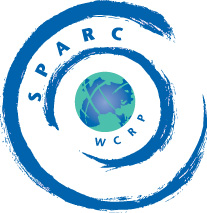 |
Stratospheric Processes And their Role in Climate
|
||||||||
| Home | Initiatives | Organisation | Publications | Meetings | Acronyms and Abbreviations | Useful Links |
![]()
 |
Stratospheric Processes And their Role in Climate
|
||||||||
| Home | Initiatives | Organisation | Publications | Meetings | Acronyms and Abbreviations | Useful Links |
![]()
Ulrich Schmidt, Institute for Meteorology and Geophysics, Frankfurt, Germany (u.schmidt@meteor.uni-frankfurt.de)
In this context, a two-day national workshop was convened and hosted by our research group at the Johann Wolfgang Goethe Universität, Frankfurt am Main, on 8-9 April 2002. About 60 scientists from almost all German atmospheric research groups and in particular SPARC-related research groups attended the meeting, which to a large part was sponsored by BMBF.
The scientific programme of the first day was dedicated (1) to review the results of the German activities related to SPARC that have been obtained during the last five years and (2) to document their actual status. The following list of the presentations illustrates the broad range of national scientific activities in the field of the different SPARC foci.
Reviews were given by H. Fischer (Mainz) on experimental studies of transport and mixing processes at mid-latitudes, by V. Wirth (Mainz) on numerical modelling, by M. Volk (Frankfurt) on the structure and composition of the UTLS in the tropical region, by J. Crowley (Mainz) on photo-oxidation processes, by B. Kärcher and U. Schumann (Oberpfaffenhofen) on atmospheric effects of aircraft emissions, and by M. Rex and P. V.D. Gathen (Potsdam) on Arctic ozone depletion.
Several German scientists were involved in the preparation of the recent SPARC assessments. B. Naujokat (Berlin) presented a summary of the climatology of the NH stratosphere based on the FU-Berlin data. Short reports were given by K. Labitzke (Berlin) on stratospheric temperature trends, by C. Schiller (Jülich) on stratospheric and upper tropospheric water vapour, and by H. Smit (Jülich) on ozone trends. A. Engel (Frankfurt) reviewed the recent observations of GHGs (others than H2O) and F.-J. Lübken (Kühlungsborn) talked about trends in the mesosphere. The issue of a potential change in the stratospheric circulation was addressed by W. Steinbrecht (Hohenpeißenberg).
Overview talks of recent research results on halogen chemistry and on NOy-chemistry were given by F. Stroh (Jülich) by H. Oelhaf (Karlsruhe). G. Schmitz (Kühlungsborn) talked about the results of recent work on the role of gravity waves and M. Riese (Jülich) discussed the global observations of dynamical processes performed by the shuttle experiment CRISTA. G. Seckmeyer (Hannover) reviewed the national contributions to the investigation of global UV-B trends.
Numerical simulations of the effects of natural processes (AO, NAO etc.) were discussed by H. Graf (Hamburg), while U. Langematz (Berlin) reviewed the results of model experiments to investigate the impact of anthropogenic changes in global distributions of ozone and GHGs.
The programme of the second day focussed on presentations of national activities in other programmes that are of interest to SPARC. The talks included reports on EUROTRAC (by A. Volz-Thomas, Jülich), on the NDSC (by K. Künzi, Bremen), and on the observational programme for GAW (by P. Winkler, Hohenpeissenberg). S. Bühler (Bremen) presented the actual status of the implementation of the new European COST Action 723 on UTLS research.
The successful launch of Envisat on the 1st March 2002 was a new exciting challenge, in particular for the national scientific community, to make use of the new global data sets that will be provided by the three chemistry instruments on board the Envisat. Overview presentations on SCIAMACHY and MIPAS were given by J. Burrows (Bremen) and H. Fischer (Karlsruhe), respectively.
The open discussion of the structure of future national contributions to international atmospheric research programmes started after a talk by M. Dameris (Oberpfaffenhofen) who presented an overview of the present status of the German national “Atmospheric Research Programme (AFO 2000)”. H. Bauer (Munchen) summarised the available information about the future funding policy of the European Commission.
The plenum presented and discussed further the available information about future directions and planned activities in some international programmes such as SOLAS/IGBP (Surface Ocean Lower Atmosphere Study) and IGACO, the atmospheric chemistry team of IGOS project. The European Commission recently published a call to submit ‘Expressions of interest (EoI)’ for ‘Integrated Projects (IP)’ and ‘Networks of Excellence (NoE). Plans and existing initiatives for this action were discussed as well as some large joint projects in the field of atmospheric research to be proposed to the major funding agencies BMBF and DFG in the frame of a possible future national research programme.
![]()